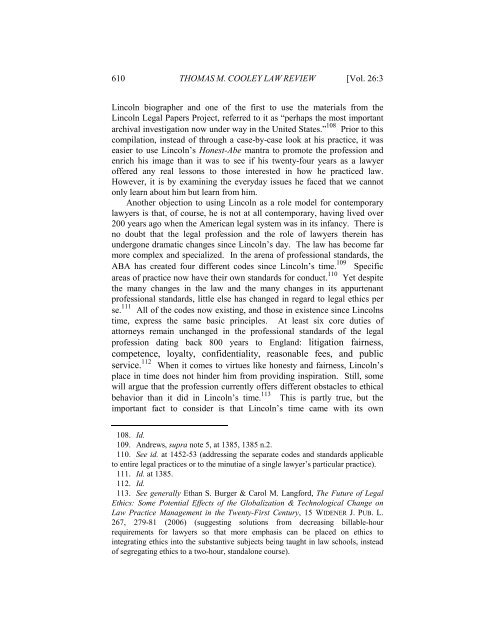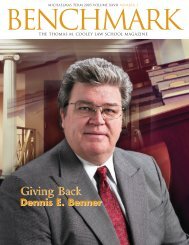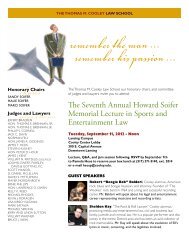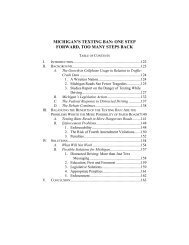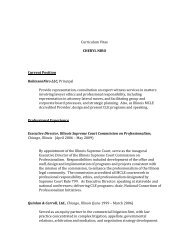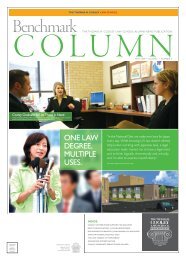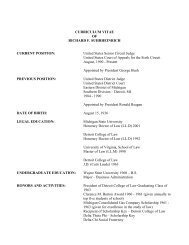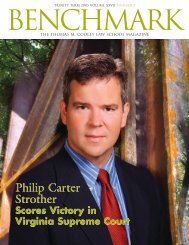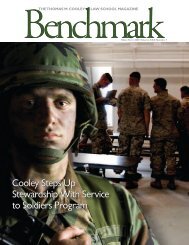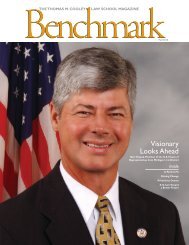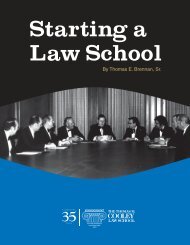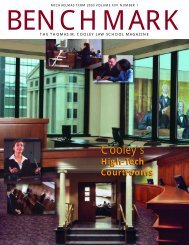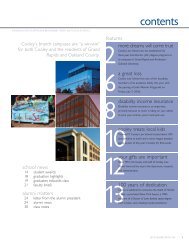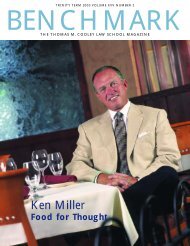Beyond The Model Rules - Thomas M. Cooley Law School
Beyond The Model Rules - Thomas M. Cooley Law School
Beyond The Model Rules - Thomas M. Cooley Law School
You also want an ePaper? Increase the reach of your titles
YUMPU automatically turns print PDFs into web optimized ePapers that Google loves.
610 THOMAS M. COOLEY LAW REVIEW [Vol. 26:3Lincoln biographer and one of the first to use the materials from theLincoln Legal Papers Project, referred to it as “perhaps the most importantarchival investigation now under way in the United States.” 108 Prior to thiscompilation, instead of through a case-by-case look at his practice, it waseasier to use Lincoln’s Honest-Abe mantra to promote the profession andenrich his image than it was to see if his twenty-four years as a lawyeroffered any real lessons to those interested in how he practiced law.However, it is by examining the everyday issues he faced that we cannotonly learn about him but learn from him.Another objection to using Lincoln as a role model for contemporarylawyers is that, of course, he is not at all contemporary, having lived over200 years ago when the American legal system was in its infancy. <strong>The</strong>re isno doubt that the legal profession and the role of lawyers therein hasundergone dramatic changes since Lincoln’s day. <strong>The</strong> law has become farmore complex and specialized. In the arena of professional standards, theABA has created four different codes since Lincoln’s time. 109 Specificareas of practice now have their own standards for conduct. 110 Yet despitethe many changes in the law and the many changes in its appurtenantprofessional standards, little else has changed in regard to legal ethics perse. 111 All of the codes now existing, and those in existence since Lincolnstime, express the same basic principles. At least six core duties ofattorneys remain unchanged in the professional standards of the legalprofession dating back 800 years to England: litigation fairness,competence, loyalty, confidentiality, reasonable fees, and publicservice. 112 When it comes to virtues like honesty and fairness, Lincoln’splace in time does not hinder him from providing inspiration. Still, somewill argue that the profession currently offers different obstacles to ethicalbehavior than it did in Lincoln’s time. 113 This is partly true, but theimportant fact to consider is that Lincoln’s time came with its own108. Id.109. Andrews, supra note 5, at 1385, 1385 n.2.110. See id. at 1452-53 (addressing the separate codes and standards applicableto entire legal practices or to the minutiae of a single lawyer’s particular practice).111. Id. at 1385.112. Id.113. See generally Ethan S. Burger & Carol M. Langford, <strong>The</strong> Future of LegalEthics: Some Potential Effects of the Globalization & Technological Change on<strong>Law</strong> Practice Management in the Twenty-First Century, 15 WIDENER J. PUB. L.267, 279-81 (2006) (suggesting solutions from decreasing billable-hourrequirements for lawyers so that more emphasis can be placed on ethics tointegrating ethics into the substantive subjects being taught in law schools, insteadof segregating ethics to a two-hour, standalone course).


